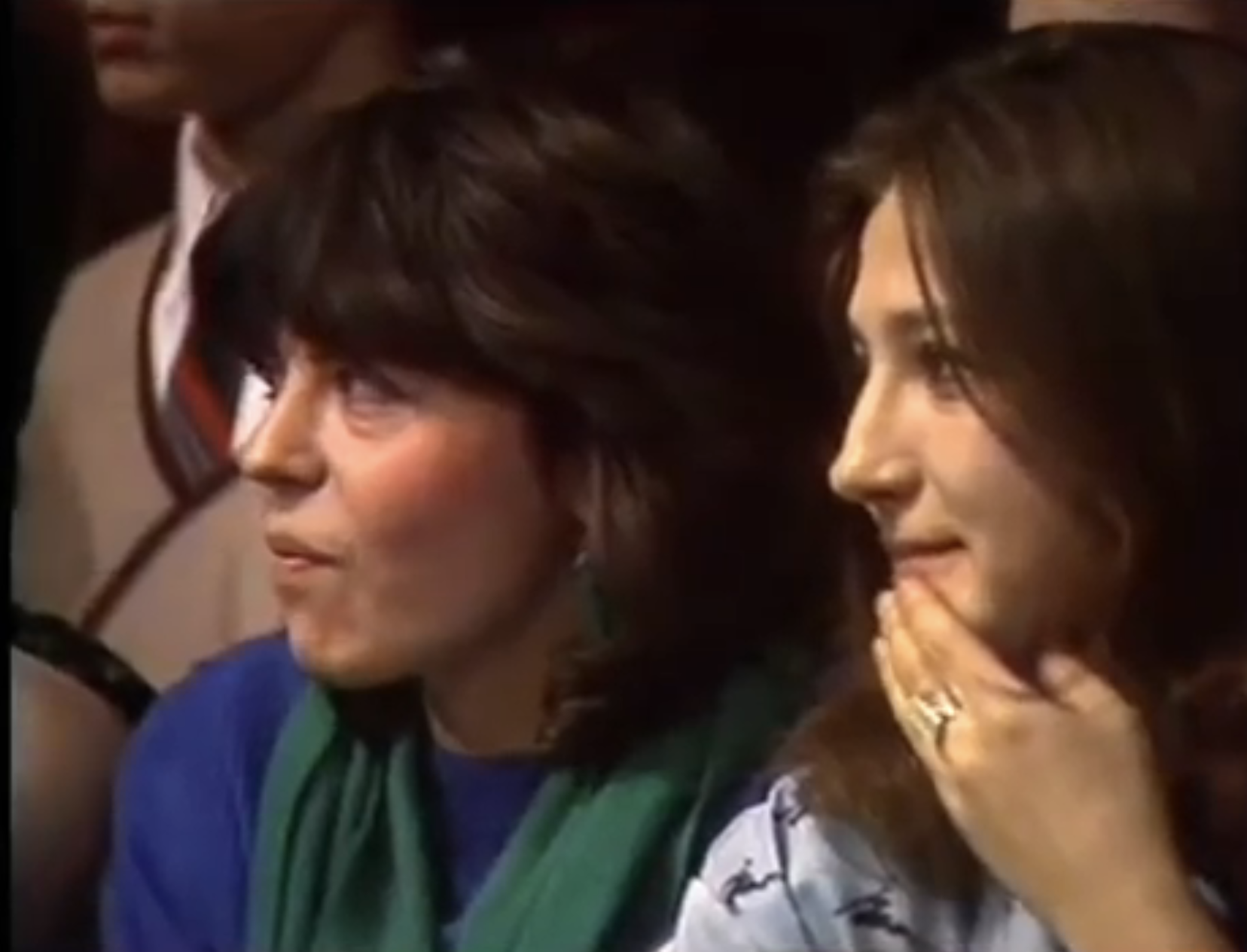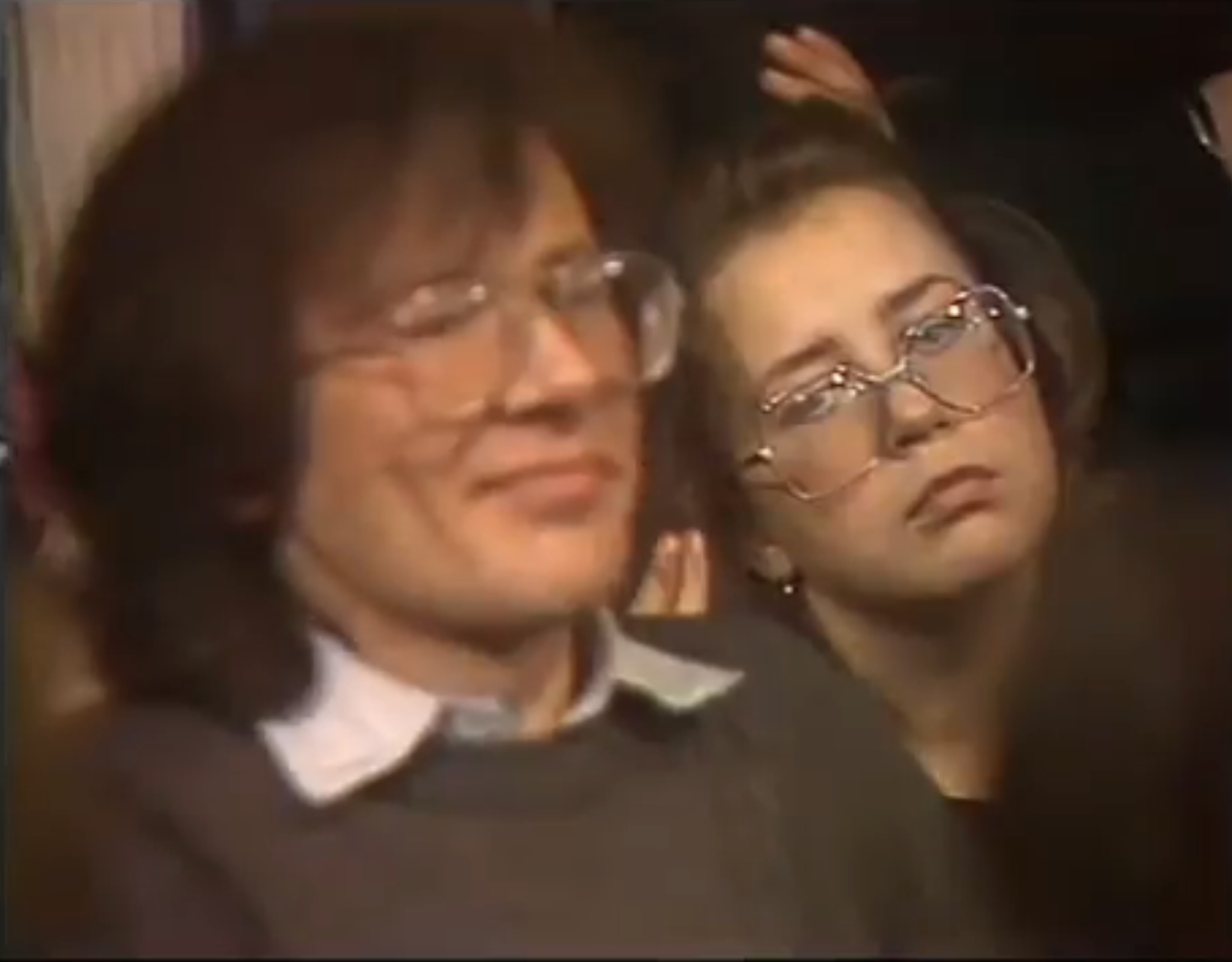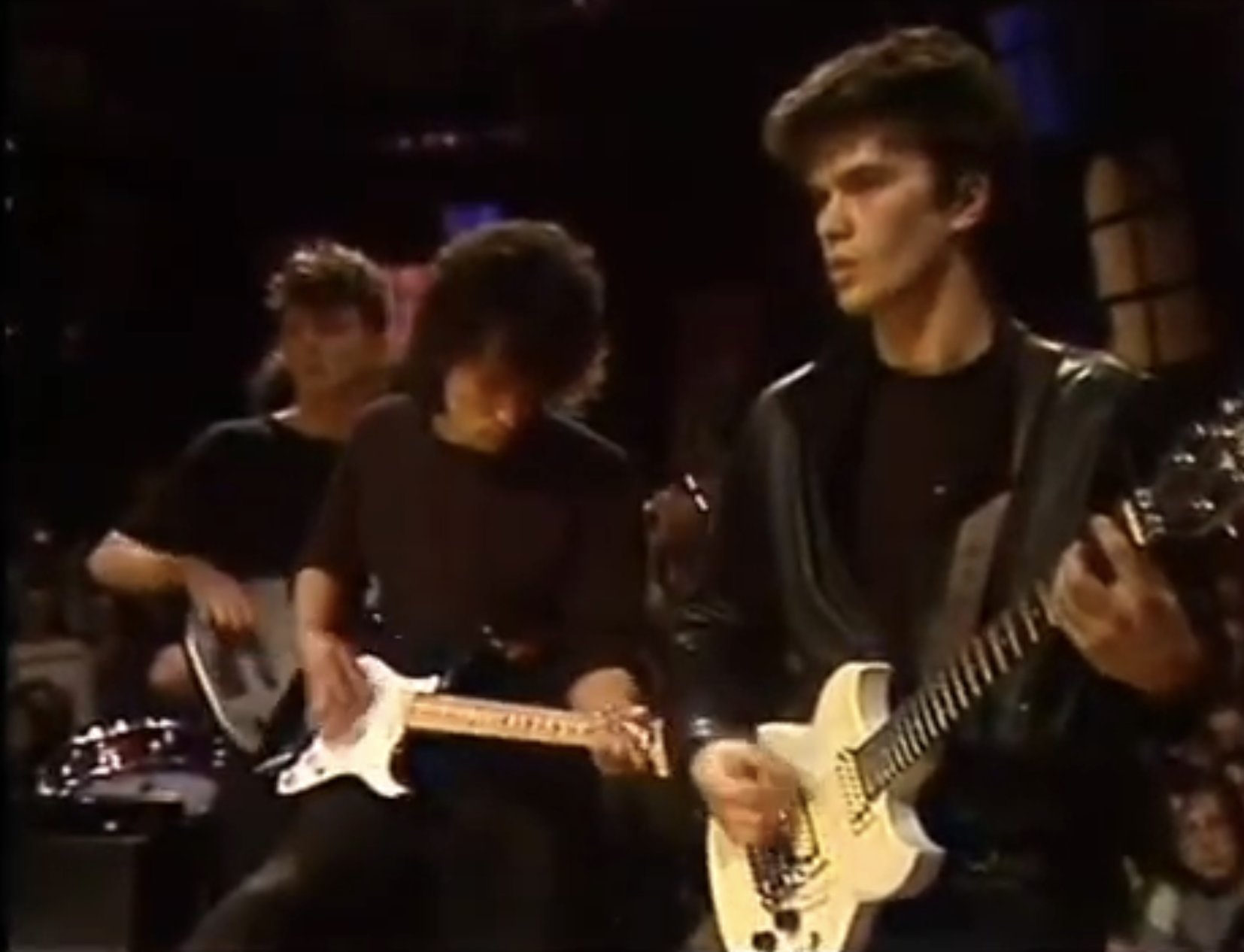“Musical Ring” with guest star Sergei Kuryokhin, 1987
[4 items]
1
00:00:32,360 --> 00:00:35,040
TAMARA MAKSIMOVA
PRESENTS
2
00:00:35,800 --> 00:00:39,040
THE MUSICAL RING
GOLD COLLECTION
3
00:00:39,720 --> 00:00:42,560
SERGEY KURYOKHIN
1987
4
00:00:43,280 --> 00:00:44,280
Good evening.
5
00:00:44,360 --> 00:00:48,560
The subject for tonight's session
was prompted by this short letter:
6
00:00:48,720 --> 00:00:51,760
"We recently listened
to a fantastic BBC broadcast
7
00:00:51,920 --> 00:00:56,600
about the UK release of two records
by Leningrad artist Sergey Kuryokhin.
8
00:00:56,760 --> 00:00:59,480
Who is he?
We'd never heard of him.
9
00:00:59,640 --> 00:01:03,280
Over there, they say he's
one of the best Soviet jazz artists,
10
00:01:03,440 --> 00:01:06,240
and also our most avant-garde composer.
11
00:01:06,400 --> 00:01:08,800
He was even a big story
in some magazine.
12
00:01:08,960 --> 00:01:11,560
Are we being kept in the dark again?
13
00:01:11,720 --> 00:01:14,800
Is this Glasnost?
Or are we once more like children
14
00:01:14,960 --> 00:01:18,600
being told that the voice
of the enemy is leading us astray?
15
00:01:18,760 --> 00:01:23,200
That's from V.K. and
12 other truth-seekers in Kolomna.
16
00:01:23,920 --> 00:01:25,840
Well, I have to break it to you
17
00:01:26,000 --> 00:01:29,720
that these Kuryokhin records
aren't the only ones out in the UK.
18
00:01:29,880 --> 00:01:34,800
There are 14 others available
in a number of Western countries.
19
00:01:35,560 --> 00:01:40,760
Keyboard magazine dedicates
almost an entire edition
20
00:01:40,920 --> 00:01:45,840
to the artistry of the
33-year-old composer from Leningrad.
21
00:01:46,000 --> 00:01:49,000
Dozens of other magazines
22
00:01:49,160 --> 00:01:53,840
have published leading articles on
his work with the Pop-Mechanics collective.
23
00:01:54,000 --> 00:01:58,240
That said, it's much easier to answer
V.K and the 12 Kolomna truth-seekers
24
00:01:58,400 --> 00:02:01,360
than it was, say, half a year ago.
25
00:02:01,520 --> 00:02:06,200
Firstly, Nikolai Obukhovich's movie
<i>Dialogues</i>, featuring Kuryokhin,
26
00:02:06,360 --> 00:02:08,000
has finally been released.
27
00:02:08,160 --> 00:02:12,680
Secondly, a festival in Alma-Ata
has awarded Kuryokhin
28
00:02:12,840 --> 00:02:16,480
the prize for Best Score
in the film <i>Mister Designer</i>.
29
00:02:16,640 --> 00:02:21,120
Finally, Soviet Screen magazine
has published an article on Kuryokhin
30
00:02:21,280 --> 00:02:25,480
entitled "The more chaos, the better".
31
00:02:25,640 --> 00:02:31,000
And now, appearing on
your television screens at last
32
00:02:31,160 --> 00:02:35,400
is Sergey Kuryokhin, our guest
on The Musical Ring.
33
00:02:36,200 --> 00:02:40,000
RING
34
00:02:49,840 --> 00:02:51,080
Thank you very much.
35
00:02:53,280 --> 00:02:57,760
We're going to show you
a variety of the music we perform.
36
00:02:57,920 --> 00:02:59,640
This music varies
37
00:03:00,400 --> 00:03:04,680
in terms of expression, character,
musical language, everything.
38
00:03:04,840 --> 00:03:08,880
We'd love to hear
what you think of it.
39
00:03:12,560 --> 00:03:15,920
Does it have some kind of meaning,
or anything like that?
40
00:03:16,120 --> 00:03:17,600
Our first piece
41
00:03:18,080 --> 00:03:21,160
is a duet for two acoustic instruments.
00:00:32,360 --> 00:00:35,040
TAMARA MAKSIMOVA
PRESENTS
2
00:00:35,800 --> 00:00:39,040
THE MUSICAL RING
GOLD COLLECTION
3
00:00:39,720 --> 00:00:42,560
SERGEY KURYOKHIN
1987
4
00:00:43,280 --> 00:00:44,280
Good evening.
5
00:00:44,360 --> 00:00:48,560
The subject for tonight's session
was prompted by this short letter:
6
00:00:48,720 --> 00:00:51,760
"We recently listened
to a fantastic BBC broadcast
7
00:00:51,920 --> 00:00:56,600
about the UK release of two records
by Leningrad artist Sergey Kuryokhin.
8
00:00:56,760 --> 00:00:59,480
Who is he?
We'd never heard of him.
9
00:00:59,640 --> 00:01:03,280
Over there, they say he's
one of the best Soviet jazz artists,
10
00:01:03,440 --> 00:01:06,240
and also our most avant-garde composer.
11
00:01:06,400 --> 00:01:08,800
He was even a big story
in some magazine.
12
00:01:08,960 --> 00:01:11,560
Are we being kept in the dark again?
13
00:01:11,720 --> 00:01:14,800
Is this Glasnost?
Or are we once more like children
14
00:01:14,960 --> 00:01:18,600
being told that the voice
of the enemy is leading us astray?
15
00:01:18,760 --> 00:01:23,200
That's from V.K. and
12 other truth-seekers in Kolomna.
16
00:01:23,920 --> 00:01:25,840
Well, I have to break it to you
17
00:01:26,000 --> 00:01:29,720
that these Kuryokhin records
aren't the only ones out in the UK.
18
00:01:29,880 --> 00:01:34,800
There are 14 others available
in a number of Western countries.
19
00:01:35,560 --> 00:01:40,760
Keyboard magazine dedicates
almost an entire edition
20
00:01:40,920 --> 00:01:45,840
to the artistry of the
33-year-old composer from Leningrad.
21
00:01:46,000 --> 00:01:49,000
Dozens of other magazines
22
00:01:49,160 --> 00:01:53,840
have published leading articles on
his work with the Pop-Mechanics collective.
23
00:01:54,000 --> 00:01:58,240
That said, it's much easier to answer
V.K and the 12 Kolomna truth-seekers
24
00:01:58,400 --> 00:02:01,360
than it was, say, half a year ago.
25
00:02:01,520 --> 00:02:06,200
Firstly, Nikolai Obukhovich's movie
<i>Dialogues</i>, featuring Kuryokhin,
26
00:02:06,360 --> 00:02:08,000
has finally been released.
27
00:02:08,160 --> 00:02:12,680
Secondly, a festival in Alma-Ata
has awarded Kuryokhin
28
00:02:12,840 --> 00:02:16,480
the prize for Best Score
in the film <i>Mister Designer</i>.
29
00:02:16,640 --> 00:02:21,120
Finally, Soviet Screen magazine
has published an article on Kuryokhin
30
00:02:21,280 --> 00:02:25,480
entitled "The more chaos, the better".
31
00:02:25,640 --> 00:02:31,000
And now, appearing on
your television screens at last
32
00:02:31,160 --> 00:02:35,400
is Sergey Kuryokhin, our guest
on The Musical Ring.
33
00:02:36,200 --> 00:02:40,000
RING
34
00:02:49,840 --> 00:02:51,080
Thank you very much.
35
00:02:53,280 --> 00:02:57,760
We're going to show you
a variety of the music we perform.
36
00:02:57,920 --> 00:02:59,640
This music varies
37
00:03:00,400 --> 00:03:04,680
in terms of expression, character,
musical language, everything.
38
00:03:04,840 --> 00:03:08,880
We'd love to hear
what you think of it.
39
00:03:12,560 --> 00:03:15,920
Does it have some kind of meaning,
or anything like that?
40
00:03:16,120 --> 00:03:17,600
Our first piece
41
00:03:18,080 --> 00:03:21,160
is a duet for two acoustic instruments.
Making its debut in 1984, Musical Ring was a perestroika-era Soviet television program dedicated to showcasing new musical talent and fostering a live audience Q&A. This 1987 segment features composer and avant-garde jazz pianist Sergei Kuryokhin (1954-1996) and his band, Pop Mekhanika. Kuryokhin begins his performance by fulfilling the socially didactic imperative of Musical Ring as a Soviet educational program (kulturnoobrazovatel’naia programma) in explaining the stylistic language of his avant-garde jazz compositions to the audience (from 2:53 in the clip above). The program triangulates among the audience, whose comments range from complimentary to openly antagonistic; the Soviet rock community; and the ostensibly impartial film crew. For example, the camera zooms in on Marina Smirnova (1962-), the lead actress in Rashid Nugmanov’s (1954-) The Needle (1988), to gauge her reaction to an audience question. Similarly, a shot of snickering Soviet rock historian Andrei Burlaka (1955-) helps manufacture conflict between the “avant-garde” rock community and the “philistine” public—foreshadowing the simmering controversy producers would inject into post-Soviet talk shows, a forum on cultural discourse and a mainstay of television mass culture in the Putin years.
The ritualized inscription of underground experimental music into the Russian literary canon and the broadly defined “Russian national idea” is another noteworthy feature of this episode. At one point, an audience member compares Kuryokhin’s work to Lev Tolstoy’s (1828-1910) Anna Karenina (1873-1877), another mentions Russian Futurist poet Vladimir Mayakovsky (1893-1930), and a point of heated debate regarding Russian folklore provokes Kuryokhin’s impassioned (or possibly ironic?) defense of Pop Mekhanika’s music as possessing a Russian musical heritage.
The program establishes Kuryokhin as an artist intent on mixing genres and styles in his music, expanding the sonic and compositional potentialities of Soviet rock-and-roll. He displays the full breadth of his stylistically amorphous musical project when he welcomes members of the Leningrad Rock Club and the band Kino—including Viktor Tsoi (1962-1990)—to join a chamber orchestra that plays his third composition. The characteristic theatricality of Pop Mekhanika’s performances morphs into experimental theater, featuring a fashion show, stage sets, costumes, and audience participation. Throughout episode, Kuryokhin artfully wields the postmodern rhetorical weapon of stiob by seamlessly interweaving formal musical discourse with farce and trolling. An artistic and communicative device that originated in late-Soviet underground subculture, stiob would become a defining mode of expression during perestroika and the post-Soviet period.


